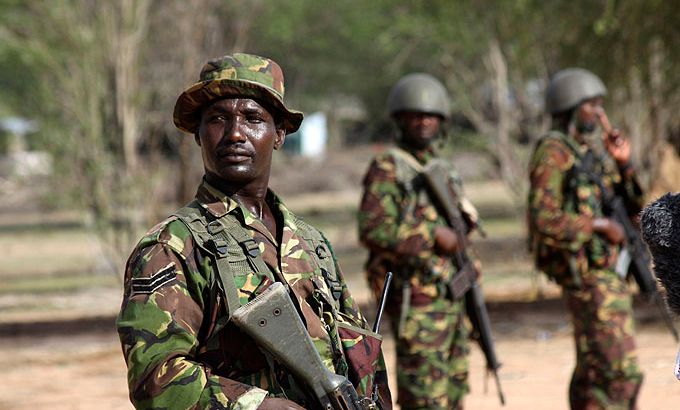Kenya says making gains against al-Shabab
Kenyan and pro-Somali government forces claim to have captured a key al-Shabab base and killed 75 of its fighters.

Kenyan troops and pro-Somali government forces say they have captured a key base belonging to al-Shabab, the rebel Somalian Islamist group, and killed 75 of its fighters.
The offensive, which began on Sunday, is in retaliation to a spate of kidnappings of Westerners from Kenyan territory in the last couple of weeks, the recent being the abduction of two Spanish aid workers from Dadaab refugee camp.
“Our forces will be concentrating on operations in Afmadow region today,” Major Emmanuel Chirchir, Kenyan army spokesman, said on Tuesday.
“We will not give up at all, we will not be cowed or intimidated by the Shabab.”
The joint forces are slowly moving towards Afmadow, just north of Kismayo, a port city where several foreigners who were kidnapped in Kenya are believed to be held.
Nairobi had been under growing pressure to take action and attempt to restore confidence that it could safely host tourists and one of the world’s largest aid communities.
Amid the operation against al-Shabab, Yusuf Haji, the Kenyan defence minister and Moses Wetangula, the foreign minister, visited the Somali capital Mogadishu on Tuesday to map out a common strategy.
Both countries signed an agreement to “co-operate in undertaking security and military operations” including “co-ordinated pre-emptive action”, the AFP news agency reported.
However, doubts have been raised about Kenya’s ability to conduct a drawn-out military campaign.
Al Jazeera’s Peter Greste, reporting from Nairobi, said: “Kenya has a very inexperienced military force. It is up against a guerilla force which has enormous amount of experience and has been fighting almost non-stop for the past five-six years.”
“So, the balance of experience weighs very much against Kenya. It is also not clear whether Kenya has the capacity to maintain logistical operations it needs to do to keep a fighting force going,” he said.
“There is also lot of heavy rain in that part of the region and so maintaining a logistical supply line is going to be very difficult.”
Suicide blast
The assault has prompted dire warnings of revenge from al-Shabab, who deny being behind the recent kidnappings.
Sheikh Hassan Dahir Aweys, a senior al-Shabab leader, said that Kenya would face the consequences of moving troops into Somalia.
“Kenya has joined the list of occupiers of another country’s land, and history will tell what happens to their aggression,” Aweys told AFP by telephone from Somalia.
In what appeared to be a revenge attack, at least four people were killed and 15 others injured in a car-bomb blast near the Somali foreign ministry building in Mogadishu on Tuesday.
It is believed that the Kenyan defence minister and foreign minister were meeting Somali officials in the offices of the foreign ministry when the blast took place.
The explosion did not damage the ministry building, but did tear down a stone wall in front of it.
Hundreds of onlookers gathered to see the demolished car scattered across the road. Several body parts littered the street, witnesses said.
Tuesday’s attack was the second in the Somali capital this month. A suicide lorry bomb struck a compound housing several government ministries in Mogadishu on October 4, killing more than 70 people.
Meanwhile, police stepped up security and strengthened their intelligence mechanisms, particularly in Nairobi, the Kenyan capital.